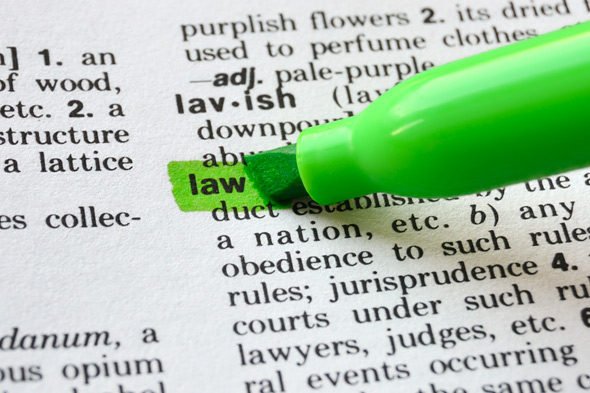
While any consumer who purchases a defective product might feel cheated and disappointed, the level of frustration increases dramatically when the defective product is a car, truck, SUV, motorhome, boat, or another vehicle. These types of consumer products entail investments of thousands or tens of thousands of dollars, so consumers should understand their rights if they get stuck with a lemon. There are many important legal definitions that consumers need to know when dealing with a manufacturer of a defective vehicle. We have provided definitions of some key terms below.
Lemon Law Legal Definitions
Lemon Law
While lemon laws vary depending on the state, these consumer protection statutes are intended to reinforce consumer rights. The laws generally define when a new vehicle is a lemon based on the amount of the time the vehicle is in the shop or the number of times a repair facility fails to fix a problem. Lemons laws give the manufacturer a reasonable opportunity to perform repairs. However, the owner or lessee of a vehicle generally can seek damages like the cost of a refund or a replacement vehicle along with legal fees and court costs if repair attempts fail.
Substantial Defect
Many lemon laws require that the problem with a vehicle be a “substantial defect,” which is an issue covered by the warranty that adversely impacts the vehicle’s value, safety, or use. While defects that affect the steering or braking systems will usually qualify, a loose tuning knob on the car stereo would not constitute a basis for a lemon law claim.
Reasonable Repair Attempts
While the manufacturer must be provided a reasonable opportunity to correct the problem, this does not mean that a consumer must make endless trips to the authorized repair facility. Most lemon law statutes define reasonable repair attempts based on a fixed number of attempts (e.g. four attempts) or a certain number of days that the vehicle is out of service. Depending on the state, the number of repairs might be as low as one if the problem involves a safety defect.
Magnuson-Moss Warranty Act
The Magnuson-Moss law is sometimes referred to as the federal lemon law. The federal statute provides remedies to consumers with defective vehicles covered by an express (written) warranty. This law can provide broader protection to consumers for vehicles that might not be covered by a state lemon law like a boat or motorhome, as well as other situations where the conditions relevant to a state lemon law have not been satisfied.
Warranties
Warranties can be written (express warranties) or implied by law. Warranties can be offered for a new vehicle or used vehicle. A service contract or extended warranty also can provide a basis for pursuing legal rights under the Magnuson-Moss law. A warranty basically defines the conditions and period during which the manufacturer or retailer will replace, repair, or compensate a buyer for a defective product free of charge. An express warranty is a written guarantee. Two important implied warranties might also be relevant if you have a defective vehicle: (1) warranty of merchantability and (2) the warranty of fitness for particular purpose. The warranty of merchantability assures that a product will work when used for the purpose intended for the product. The rationale behind this warranty is that the vendor is in a better position to know if a product will perform correctly. The warranty of fitness for a particular purpose applies when a seller has a reason to know of a particular purpose for the goods which the buyer relies on when selecting the product. For example, the purchaser of a vehicle who voices a need for a vehicle that handles rugged terrain and snow might have a warranty claim if the vehicle is not fit for this use.
Extended Warranty
This is a special type of warranty that can justify federal lemon law liability for a vehicle no longer covered by the manufacturer warranty. This service contract obligates the indicated company to offset repair costs after the purchase of a new or used vehicle. This service contract kicks in after the expiration of the manufacturer’s bumper to bumper warranty. Vehicle owners will have to pay an additional fee for this type of warranty.
Arbitration
Once a consumer provides notice of a lemon law violation to a vehicle manufacturer, the parties will often have to submit to arbitration to resolve the matter. While a lemon law statute sometimes governs arbitration through a state-run arbitration process, other states handle arbitration of lemon law claims through a private group. This type of alternate dispute resolution (ADR) involves an informal trial with a panel or individual determining the outcome. The consumer and manufacturer are both permitted to explain their side of the issue, and mechanical or engineering experts often provide evidence for either side. Consumers should consider legal representation because most arbitrations are resolved in the manufacturer’s favor. In many states, the arbitrator’s decision regarding replacement or reimbursement is binding on the manufacturer but not the consumer.
Speak to an Auto Fraud Lawyer
The process of pursuing a claim for a defective vehicle can be complicated and confusing. These are only a few of the legal terms that you might encounter. If you have specific questions about your legal rights under your state lemon law or other consumer protection laws, Stern Law, PLLC offers tenacious representation of consumers. We offer a free consultation, so call Stern Law, PLLC at (844) 808-7529 or submit a confidential lemon law inquiry form.



 (844) 808-7529
(844) 808-7529

 (844) 808-7529
(844) 808-7529